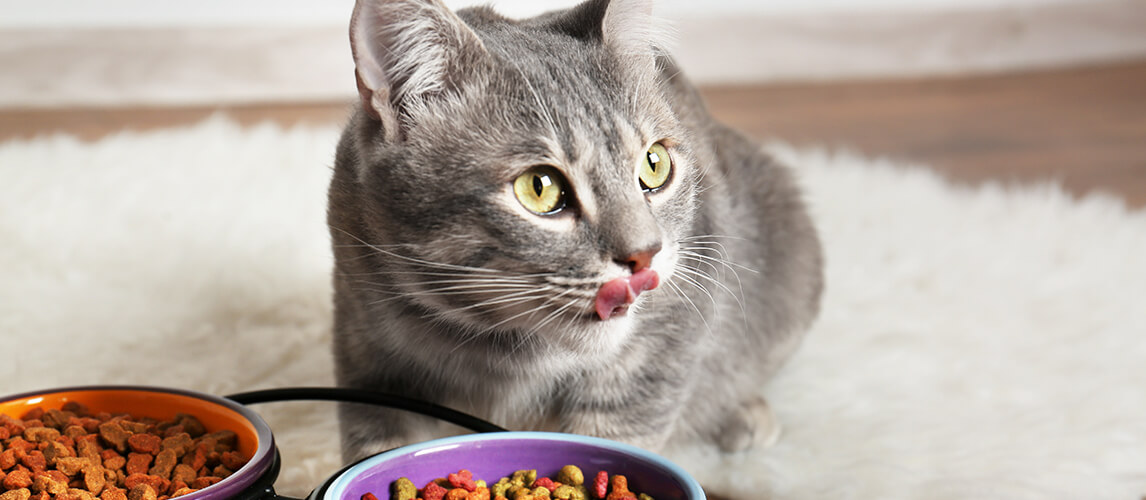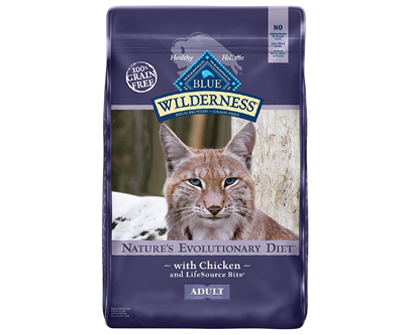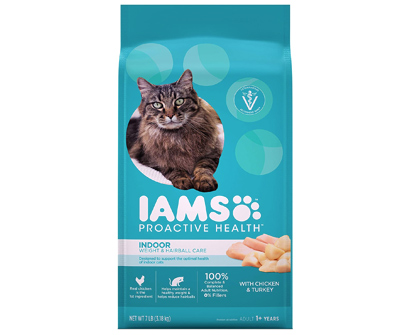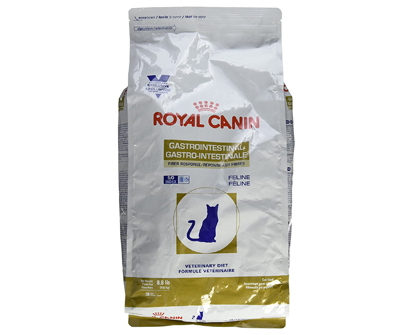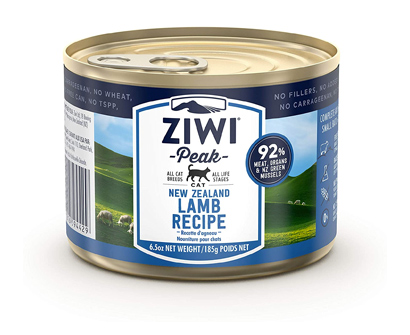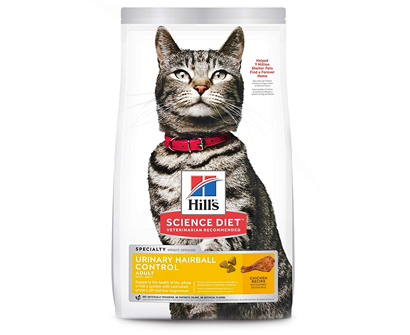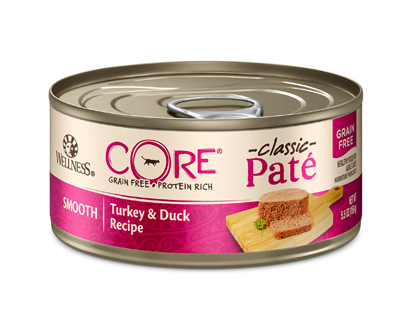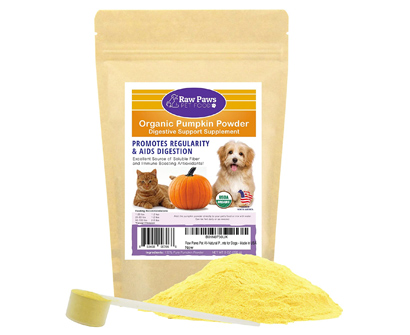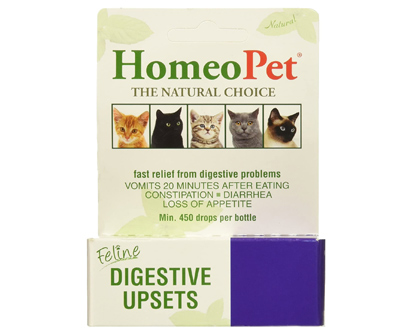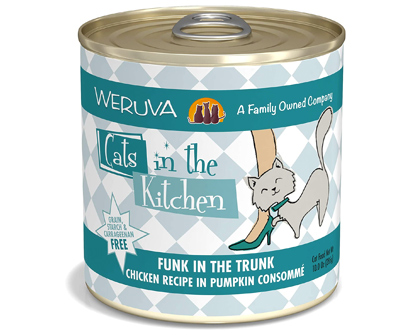- The Best Cat Food for Constipation
- 1. Blue Buffalo Wilderness Protein Cat Food for Constipation
- 2. IAMS Proactive Health Cat Food for Constipation
- 3. Royal Canin Fiber Cat Food for Constipation
- 4. Ziwi Peak Grain-Free Cat Food for Constipation
- 5. Hill’s Science Diet Cat Food for Constipation
- 6. Wellness Core Classic Pâté Low Residue Cat Food
- 7. Raw Paws Low Residue Cat Food
- 8. HomeoPet Low Residue Cat Food
- 9. Weruva Wet Low Residue Cat Food
Constipation is a painful but common digestive problem for many cats. It occurs when the stool is too dry or too firm to expel, causing distress and pain for your pet. Healthy felines have daily and easy bowel movement, so if your kitty doesn’t use her litter box once a day, or if she does but it’s followed by crying and straining, it’s more than likely she suffers from constipation. If left untreated, constipation can lead to megacolon, a condition in which your pet’s colon is irreversibly stretched.
So how can you help your kitty become healthier? One, increase their water intake, and two, change their diet. Cat foods with more fiber, moisture or specially formulated to support feline digestive health are the way to go. To help you find the best cat food for constipation more easily, we’ve done the research for you. Below, you’ll find 10 quality cat foods and supplements, all made with nutritious and healthy ingredients. And if you need more information? Our buying guide and FAQ section await you.
The Best Cat Food for Constipation
1. Blue Buffalo Wilderness Protein Cat Food for Constipation
Key Features
Calorie content: 3,832 kcal/kg, 443 kcal/cup
Crude protein: 40%
Crude fat: 18%
Crude fiber: 4%
Maximum moisture: 9%
With essential vitamins and minerals, Taurine
First three ingredients: deboned chicken, chicken meal, pea protein
Inspired by the diet of lynx, a wild relative of our domesticated cats, Blue Wilderness Protein Grain-Free dry food contains everything adult cats need to be healthy and happy. Made with lots of quality animal protein, healthy fats that mostly come from fish, as well as complex carbohydrate sources rich in fiber, this is one nutritious cat food that both healthy felines and those prone to constipation can consume.
The recipe’s first two ingredients are deboned chicken and chicken meal, which provide most of the protein content (a whopping 40%!). Menhaden fish meal also boosts the protein content plus adds the much necessary omega-3 fatty acids to the mix, which help lower the inflammation and promote skin and coat health. The formula also contains several antioxidant and fiber-packed ingredients, including peas and pea fiber, flaxseed, dehydrated alfalfa meal, sweet potatoes, carrots, blueberries, cranberries and other. There are added minerals and vitamins too, but no grains of any kind – perfect for sensitive felines with digestive problems.
2. IAMS Proactive Health Cat Food for Constipation
Key Features
Calorie content: 3,313 kcal/kg, 332 kcal/cup
Crude protein: 30%
Crude fat: 11%
Crude fiber: 8.3%
Maximum moisture: 10%
Fortified with minerals, vitamins, Taurine and L-Carnitine
First three ingredients: chicken, chicken by-product meal, corn grits
Indoor cats usually don’t have any access to cat-friendly grasses they normally chew on for their tummy health. As a result, most struggle with hairballs, constipation and as a bonus, excess weight. Iams Proactive Health Indoor Weight & Hairball Care is a great solution to this problem. Affordable, yet packed with nutritious and fiber-rich ingredients, plus essential supplements, this food promotes weight loss and supports a healthy digestive tract.
Real chicken is the first ingredient here, which is followed by the easily digestible chicken by-product meal. The tasty chicken recipe also contains various fiber-rich foods, including whole grains, veggies and fruits such as whole grain corn and sorghum, dried beet pulp, dried peas, carrots, spinach, apples and other. To boost the protein content, turkey is also a part of the formula, and so is fish oil which is rich in essential fatty acids. The food also contains L-Carnitine which helps burn fat and maintain a healthy metabolism.
3. Royal Canin Fiber Cat Food for Constipation
Key Features
Calorie content: 3687 kcal/kg, 361 kcal/cup
Crude protein: 29%
Crude fat: 13%
Crude fiber: 4.7%
Maximum moisture: 8%
With essential vitamins and minerals, Taurine
First three ingredients: brewers rice, chicken by-product meal, chicken fat
Specially formulated for cats who struggle with digestive issues such as constipation, diarrhea or vomiting, the Royal Canin’s Gastrointestinal Fiber Response nourishes the health of felines while supporting digestion and optimal stool quality.
Because this is a veterinary diet formulated to first and foremost help your cat defecate properly, the recipe is full of easily digestible nutrients, including fiber-rich grains. Some of the ingredients include chicken by-product meal, brewers rice, corn, psyllium seed husk, chicory and wheat. To boost the protein and healthy fat content, egg product, chicken fat and fish oil are also added. With a unique blend of soluble and insoluble fibers, plus highly digestible nutrients, this is a low residue cat food that helps with various tummy issues, including cat constipation.
4. Ziwi Peak Grain-Free Cat Food for Constipation
Key Features
Calorie content: 1325 kcal/kg, 245 kcal/6.5-oz can
Crude protein: 9.5%
Crude fat: 6%
Crude fiber: 2%
Maximum moisture: 78%
Enhanced with vitamins, minerals, Glucosamine and Chondroitin Sulfate
First three ingredients: lamb, water sufficient for processing, lamb lung
If you’re looking for not only good food for relieving constipation in cats, but a fantastic canned cat food in general, definitely give Ziwi Peak Wet Lamb Recipe a try. Made with high quality ingredients, including free-range and grass-fed lamb, plus healthy supplements, this wet cat food supports healthy digestion and urinary tract health, while helping decrease food sensitivities.
The first ingredient is free-range and grass-fed lamb, so you know you’re getting top-notch quality protein. Lamb organs are also there, including lung, kidney, liver, tripe and heart, which are all packed with natural vitamins, including A, D and E. There is NZ green mussel added too, as well as chickpeas and dried kelp which boost the essential fatty acid content plus fiber content. Overall, a wonderful food for all kitties and perhaps the best canned cat food for constipation!
5. Hill’s Science Diet Cat Food for Constipation
Key Features
Calorie content: 3726 kcal/kg, 327 kcal/cup
Crude protein: 29.5%
Crude fat: 16%
Crude fiber: 6.5%
With essential vitamins and minerals, Taurine and L-Carnitine
First three ingredients: chicken, whole grain wheat, corn gluten meal
Crafted with nutritious and fiber-rich ingredients, the Hill’s Science Diet Urinary Hairball Control cat food is perfect for felines struggling with urinary tract infections, hairballs and poor digestion. This chicken recipe includes easily digestible proteins, whole grains, veggies and fruits which help support the health of cats with digestive and urinary problems.
The first ingredient is animal protein source – chicken. This is followed by various fiber-packed ingredients, such as whole grain wheat, corn, dried beet pulp, powdered cellulose, apples, cranberries, broccoli and other. To provide all essential fatty acids cats need, the formula contains pork fat, soybean oil and fish oil. Thanks to natural fiber, antioxidants and optimal level of magnesium, the Hill’s cat food for constipation supports the health of the whole urinary system. Find out more about cat food for urinary tract health here.
6. Wellness Core Classic Pâté Low Residue Cat Food
Key Features
Calorie content: 215 kcal/ 5.5 oz can
Crude protein: 12%
Crude fat: 8%
Crude fiber: 1%
Maximum moisture: 78%
Fortified with minerals, vitamins, Taurine
First three ingredients: turkey, pork liver, turkey broth
If your cat is of sensitive health and occasionally suffers from poor digestion, including constipation, it may be a good idea to switch to canned cat food made of wholesome ingredients and no fillers of any kind. Wellness Core Pate is a great option – natural, high in protein and free from grains and artificial additives, this food supports the health of sensitive cats.
The animal protein sources include turkey, pork liver and duck, which ensure not only the protein content is high (12%), but all the amino acids necessary for feline health are there. The recipe includes a few other highly digestible ingredients, such as cranberries, ground flaxseed, dried kelp, chicory root extract and alfalfa meal. To support heart and eye health, Taurine is added.
7. Raw Paws Low Residue Cat Food
Key Features
Ingredients: 100% pure pumpkin powder
Natural source of fiber, antioxidants, vitamins C and A, and minerals magnesium and potassium
Whether your cat struggles with constipation or diarrhea or bloating, Organic Pumpkin Powder by Raw Paws is guaranteed to help. This supplement is a fantastic source of dietary fiber that supports your cat’s digestion with no side effects. Just sprinkle some (1 tsp per day is enough) on your pet’s normal meal, and voila – your cat will consume much more fiber without actually switching to a different kibble/wet food. For more options head over to our guide on organic cat food.
This supplement is made of 100% pure pumpkin powder which is naturally rich in fiber and low in fat. It helps promote normal bowel movement and function, healthy digestion and anal gland health. The supplement is free from any and all fillers, but naturally contains vitamin C and A, magnesium and potassium, making it perfect not only for constipated but healthy cats too.
8. HomeoPet Low Residue Cat Food
Key Features
Ingredients: veratrum album, argentum nitricum, colocynthis, pulsatilla nigricans, hypericum perforatum, arsenicum album, usp alcohol in purified water
Pure, natural, no known side effects
Another easy-to-use supplement for digestive relief, the HomeoPet’s Digestive Upset liquid is a solution to constipation, diarrhea, bloating, nausea and vomiting. Made with all-natural ingredients that are proven to support the digestive health of animals, this supplement comes with zero side effects.
The homeopathic drops use pure and natural ingredients based on years of research to promote relief from common digestive problems in cats and other pets too. There are no artificial chemicals or any fillers, only natural ingredients with no known side effects. Because these are liquid drops, they’re easy to administer – through water, food or by mouth, whatever works best for you and your cat.
9. Weruva Wet Low Residue Cat Food
Key Features
Calorie content: 628 kcal/kg, 54 kcal/ 3.2 oz can
Crude protein: 10%
Crude fat: 1.6%
Crude fiber: 0.5%
Maximum moisture: 87%
Enhanced with minerals, vitamins, Taurine
First three ingredients: chicken broth, chicken, tuna
Made with natural and delicious ingredients, the Weruva’s Funk in the Trunk wet cat food is a good choice for sensitive felines and those suffering from constipation. This is because this food is high in moisture, plus packed with chicken, tuna and pumpkin – a tasty trio that supports feline well-being, including healthy digestion.
The main protein sources are chicken and tuna which contain essential fatty acids necessary for your kitty’s overall health, including immune system health. Pumpkin is also high on the ingredient list, which, thanks to its fiber content, is known to promote stool consistency. There are also fish oil and sunflower seed oil for fat content, but the food is surprisingly low in fat (1.6%). This is a simple but healthy canned cat food that provides complete and balanced nutrition; as a bonus, it’s perfect for relieving constipation in cats!
Best Cat Food for Constipation Buying Guide & FAQ
Although mild and occasional constipation is common and rather normal in domesticated cats, frequent and more serious constipation problems require help, as if left untreated, the condition can lead to much more serious health problems. So what can you do to help your kitty have healthy digestion? First, make sure she has adequate fluid intake and then try changing her diet. If your kitty doesn’t have access to outdoor plants, it’s best to switch to hairball control formulas or recipes that are higher in fiber. To help you find the best cat food for constipation, we’ve not only put together a list of 10 excellent-quality foods, but also a buying guide containing all the relevant information on cat constipation and what you can do to help. For more options, check out our detailed review of cat food for hairballs.

Is Your Cat Constipated?
Before you start feeding your cat a different diet or force her to drink more water than she’d like to, make sure she actually is constipated. Unsure how? Compare your kitty’s bathroom habits to a healthy cat’s bathroom habits:
- Healthy cats defecate once to three times a day, every day
- Healthy cats produce firm stools that keep their shape
- A healthy cat’s stool has enough moisture, so litter will stick to it
- Healthy cats easily defecate (do not strain).
Based on this, it should be easier to see if your pet is actually constipated or not. However, if you’re still not sure, the following symptoms of constipation should provide a definite answer:
- Decreased appetite and water intake
- Vomiting
- Depression
- Crying or straining while trying to defecate
- Small, dry, hard stools
- Not producing stools for 48 hours or longer.
Generally, a constipated cat will be in quite a bit of pain and you should notice the pet is acting differently than usual. This is because the longer the cat doesn’t defecate, the more gastrointestinal upset they’ll experience. And if these issues don’t resolve on their own (which they typically don’t), constipation can become obstipation. This is a severe form of constipation in which the cat cannot clear the mass of very dry and hard stools that have been accumulating in the colon. This, unfortunately, can lead to a complete blockage of the large intestine with feces which, in turn, can result in loss of the colon’s motility. Needless to say, you really don’t want to let your kitty’s mild constipation develop into something more serious.
Causes of Constipation in Cats
Now that you know whether or not your cat is constipated (still unsure? Get your kitty to a vet!), you’re probably wondering what causes this condition in the first place. Unsurprisingly, there can be various reasons for cat constipation, including ingestion of foreign objects, side effects of certain medications, traumatic injury, infection, intestinal tumors, even obesity. But the two most common causes remain dehydration and a low-fiber diet. Let’s talk about these two potential causes and what you can do to avoid them in the first place.
Dehydration
Like all living things, cats need water in order to survive. Unfortunately, many cats have a low thirst drive, which means they don’t feel the need to drink water that often. If your cat is one of these pets, here is what you can do:
- Make sure the cat always has fresh, clean water source available. Sometimes, larger water bowls or cat water fountains can help.
- Add water to your cat's dry kibble, or wet food to ther regular diet. You can also completely replace dry food with wet food until the condition resolves.
Low-Fiber Diet
Although some pet parents, as well as some feline nutrition experts, believe that cats don’t have any physiological requirements for plant matter and therefore plant fiber, most cats, in fact, do. How is this possible? You don’t see cats eating grains and pumpkins in the wild! We hear you – however, cats who live in the wild often eat grass which supplies them with necessary fiber and nutrients, which in turn, help them eliminate all indigestible matter from their digestive tract. Here is how this works: naturally, cats lack the necessary enzymes to break down plant matter, so, when they eat vegetables and other plants, including grass, they sometimes throw up. While unpleasant (mostly for the owner), this allows the cat to get rid of all the things she cannot digest. This includes fur, bones, and feathers. Some experts speculate that certain indigestible animal parts themselves play a role of “fiber”, as they help bulk up the cat’s stool in a similar way, helping her defecate easier.
So what are indoor cats who cannot eat grass or dead animal parts suppose to do? Consume cat foods that are high in fiber; at least from time to time.
Check out our guide on the best cat food for indoor cats for more info.
Dietary Requirements For Constipated Cats
All cats have the same basic nutritional requirements, and cats who occasionally or frequently struggle with constipation are no different; except in one aspect: they typically need more fiber.
When looking for the best cat food for constipation, pay attention to the following things:
- Quality and Amount of Protein
Cats are carnivores, and as such, have high protein requirements. Ideally, you want cat foods that contain good-quality animal protein sources (muscle meats, organs, meat meals, even quality by-products are all good), as well as moderate to high amounts of protein. Otherwise healthy felines tend to do well on high-protein diets, so anything between 30-40% of protein on dry basis is excellent. Cats with serious digestion problems, including constipation or diarrhea, as well as urinary tract problems, may have different protein requirements. In any case, more serious health problems are something you should discuss with your vet (some cats may need to switch to meat-free diets, for example). For more options head over to our guide on high protein cat food.
- Quality and Amount of Fat
Cats need plenty of fat in their diet, especially those who are physically active. Look for foods that contain at least two different sources of fat, such as fish/salmon oil, canola oil, sunflower oil, chicken fat, pork fat, etc.
- Fiber (Carbohydrates)
As mentioned, many cats who suffer from constipation may greatly benefit from increased fiber intake. It’s worth noting that fiber comes in different forms and that each type reacts differently on the cat’s digestive system.
- Insoluble fiber (wheat bran, oat fiber, cellulose, various vegetables, etc.) helps bulk the stool and speed the bowel movement.;
- Soluble fiber (oat bran, barley, pectin, peas, carrots, etc.) feeds the good gut bacteria, helping improve GI motility disorders;
- Mixed fibers (psyllium, pea fiber, beet pulp, etc.) combine the benefits of both insoluble and soluble fiber.
Because fiber comes in different forms and has a variety of effects on the cat gut, it’s wise to start adding it slowly to your kitty’s diet. If your pet suffers from mild, occasional digestive issues, best foods for constipation will contain moderate amounts of fiber. If, on the other hand, your cat suffers from frequent and more serious digestive problems, they may require higher amounts of fiber in their diet. If this is your kitty, we suggest switching to a high-fiber cat food specifically crafted to treat constipation until their condition improves.
Our Top Pick
Because constipation can vary from animal to animal, there really isn’t a single best cat food for constipation. That being said, if you’re looking for an all-around healthy and well-balanced cat food that also supports digestive health thanks to its fiber content, give Blue Wilderness Grain-Free Adult Cat Food a try. Made with wholesome, quality ingredients, including lots of animal protein, moderate amounts of healthy fas and fiber, this dry cat food is a perfect preventative diet. If your kitty suffers from mild, occasional constipation, mix this kibble with water and voila – super nutritious, convenient, yet high in moisture, this cat food will nourish your pet’s overall health and wellbeing and promote regular bowel movements.

FAQ
Q: Does raw feeding cause constipation?
Although raw feeding may have a number of benefits for some cats, the truth of the matter is that most domesticated cats do better on commercial kibble and canned cat food. There are a few reasons for this, but the most important one is that raw food, whether homemade or store-bought, is often deficient in certain nutrients. More often than not, these nutrients include indigestible matter, or - you guessed it - fiber.
This doesn’t necessarily mean you have to completely switch to cooked, commercial foods if you don't want to. If your pet is generally healthy and happy on a raw diet, it’s fine to keep feeding them the same way; however, if your cat has small, dry stools or is straining when trying to defecate, it’s a good idea to add high-fiber cat food into their diet, or to try fiber supplements instead.
Q: How many days can a cat go without pooping?
Healthy cats poop one to three times a day, every day. However, it’s normal for cats to sometimes go longer without defecating – up to 48 hours is tolerable. Anything past 2 days is a cause for concern, especially if you see your cat vomiting or straining to defecate (but nothing comes out). If this happens, get your cat to a vet for a prompt examination.
Q: Can cats die from constipation?
If constipation is left untreated, it can advance into obstipation, which is a serious condition where a cat cannot eliminate a mass of hard stools that have been accumulating in the colon. The intestines get stretched (megacolon) and the barrier that normally prevents fecal bacteria from moving into bloodstream, stops functioning. As a result, the animal becomes systemically ill, and if not promptly treated, dies.
That’s why it’s crucial to treat your cat’s constipation the moment you notice it. If water, different diet and supplements seem to help a little but not a lot, consult with your vet to rule out other serious health problems, such as intestinal tumors. This said, treating constipation in cats is easy if caught on time - that's why it's important to introduce wet food or dry food specifically designed for constipation the moment you notice your kitty straining in the litter box.
Sources
- Feline Constipation, mspca angell
- Constipation, Cornell Feline Health Center
- Dr. Aja Senestraro, 9 Ways to Help Your Constipated Cat, PetMD
- The Scoop on Cat Poop, Pets WebMD

